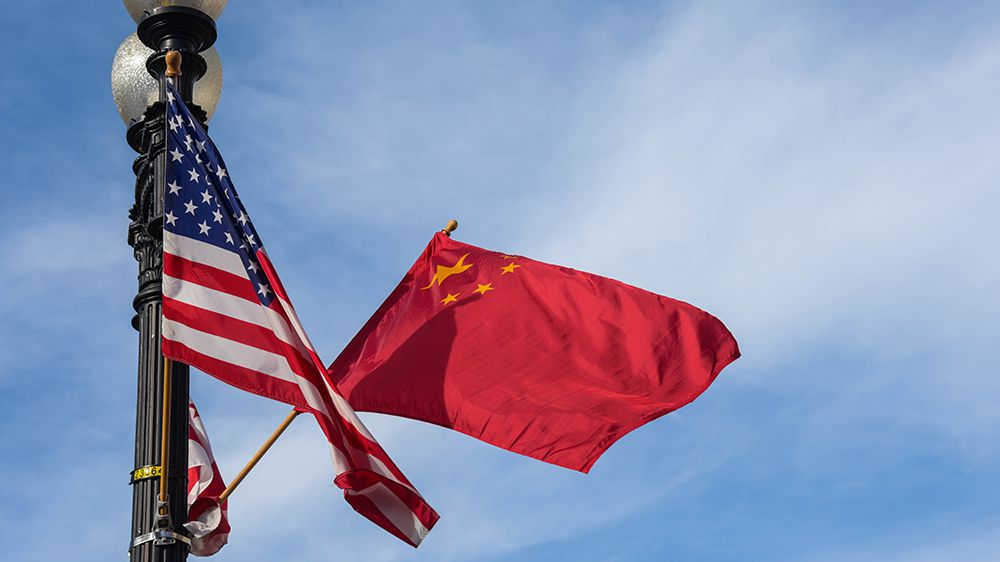Sino-US economic talks back on track

The national flags of China and the United States [Photo/Xinhua]
Two sides agree to solve problems for producers, consumers in pragmatic way
China and the United States have started normal communications in economic and trade areas, agreeing on joint efforts to solve problems for producers and consumers in a pragmatic manner, Ministry of Commerce spokesman Gao Feng said at a media briefing on Thursday.
Commenting on separate video talks that Vice-Premier Liu He had recently with US Trade Representative Katherine Tai and US Treasury Secretary Janet Yellen, Gao said the two sides exchanged ideas about, in the spirit of equality and mutual respect, issues such as China-US economic and trade relations, the macroeconomic situation and domestic policies.
Both sides believed that the exchanges were professional, candid and constructive, and that the two countries' economic and trade communications have returned to normal, he said.
Liu, who is also a member of the Political Bureau of the Communist Party of China Central Committee and chief of the Chinese side of the China-US comprehensive economic dialogue, had video conversations with Tai on May 27 and Yellen on Wednesday.
"The two sides believed that Sino-US economic and trade relations are very important, and there are many specific areas to cooperate on, while raising their own concerns. China has expressed specific concerns, giving full consideration to the domestic economic development situation," Gao said.
"The two sides agreed to jointly push for solving of specific problems for producers and consumers in a pragmatic way and promote the healthy and stable development of Sino-US economic and trade relations, from the perspective of benefiting China, the US and the world in the next step."
Experts said that since the US and China are the world's top two economies, healthy Sino-US economic and trade ties are not only important for the two nations, but also for world economic recovery amid the COVID-19 pandemic.
To pragmatically "solve specific problems for producers and consumers", tariff rollbacks are essential, especially for US producers and consumers, who have been much harder hit than their Chinese counterparts by the two countries' tariff hikes, according to experts.
Tu Xinquan, dean of the China Institute for WTO Studies at the University of International Business and Economics in Beijing, said: "Through the increased tariffs on Chinese goods, US hoped to reduce the trade deficit with China, transfer costs to Chinese exporters, and force companies to move their supply chain activities out of China to the US or other countries.
"But such expectations have failed, while the tariff surges have damaged US companies' competence, dragged down US economic development, and hurt US people due to consequently higher product prices and fewer jobs."
The US trade deficit with China has increased, and US companies are bearing the brunt of elevated tariffs on Chinese goods, Tu said, citing a recent report by rating agency Moody's Investors Service.
At the same time, US consumers have to pay more for Chinese goods such as clothes, electronic products and furniture, due to the lack of better or cheaper alternatives, while increased tariffs on Chinese intermediate products have increased US companies' production costs and hurt their competence, Tu said. This also resulted in higher inflation and fewer jobs, he added.
China overtook the US as the world's top destination for foreign direct investment flows last year, which showed that attempts to force supply chain activities out of China are in vain, Tu said.
Photos
Related Stories
- China urges U.S. to stop massive, indiscriminate wiretapping
- China, US ramp up trade dialogue, a 'positive sign of ties returning to normal talk track' despite lingering hurdles
- Chinese, U.S. senior officials hold video talks over economic ties
- China's vaccination campaign may "accelerate" Asia's recovery from pandemic: U.S. media
- Climate among key areas for potential China-U.S. cooperation: Paulson
Copyright © 2021 People's Daily Online. All Rights Reserved.










